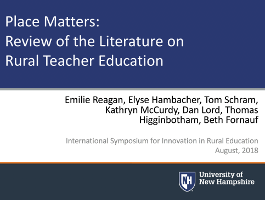Place Matters: Review of the Literature on Rural Teacher Education
Tom Schram, Kathryn McCurdy, Tom Higginbotham & Dan Lord, University of New Hampshire
Wednesday, August 1, 4:30-5:00, SUB Ballroom D, Theme: Profession
Through a review of 97 peer-reviewed articles on rural teacher education published between 2007-2017, we examine how “place” and “rurality” are conceptualized, operationalized, and investigated in the literature. Our conceptual framework builds upon the fundamental notion of place as a pedagogical construct (Gruenewald, 2003) and posits context as something that is “worked” and “worked within” by those who inhabit it and by those researchers who seek to understand its role in rural teacher education. We first analyze “how place matters” in the posing of questions and the shaping of priorities relative to the preparation, support, recruitment and retention of teachers for rural places. In doing so, we highlight distinctions between problem-based, practicum-focused, and place-conscious approaches, including how researchers can work between categories to draw on conceptualizations of place as both generalized rural space and place-specific within the same project. We then analyze how scholars operationalize and investigate place and/or rurality through a review of the empirical literature on rural teacher preparation. We find that researchers tended to investigate questions related to preparation, professional learning, recruitment and retention in and for rural places through analyses of specific programs and experiences, with limited attention to the relationship among these components or to broader initiatives. Overall, our review invites consideration of how nuanced synergies among social capital, identity, and culture contribute to understandings that bring to bear a place-specific paradigm in the preparation of teachers for rural settings. We conclude by offering recommendations for future research.
Presentation materials for download if you wish:
Click an image to download the document. This file may download immediately, or may require clicking on an additional button to download, depending on your browser.

